|
|
|
Sort Order |
|
|
|
Items / Page
|
|
|
|
|
|
|
| Srl | Item |
| 1 |
ID:
178885
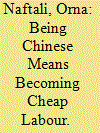

|
|
|
|
|
| Summary/Abstract |
Since the 1990s, the Chinese party-state has attempted to teach its youth how to think and speak about the nation through a “patriotic education” campaign waged in schools, the media and on public sites. The reception of these messages by youth of different social backgrounds remains a disputed issue, however. Drawing on a multi-sited field study conducted among rural and urban Han Chinese youth attending different types of schools, this article explores the effects of the patriotic education campaign on youth conceptions of the nation by examining the rhetoric high-school students employ when asked to reflect upon their nation. The study reveals that a majority of youth statements conform to the language and contents of the patriotic education campaign; however, there are significant differences in the discursive stances of urban youth and rural youth and of those attending academic and non-academic, vocational schools. These findings call into question the party-state's current vision of China as a “unified” national collectivity. They highlight the existence of variances in the sense of collective belonging and national identity of Chinese youth, while underscoring the importance of social positioning and perceived life chances in producing these variances.
|
|
|
|
|
|
|
|
|
|
|
|
|
|
|
|
| 2 |
ID:
167033
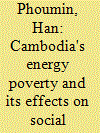

|
|
|
|
|
| Summary/Abstract |
This study aims to quantify the incidence of energy poverty in Cambodia and its potential impact on the social wellbeing of the people of Cambodia. The notion of energy poverty of a household is not well understood in the context of literature as it may refer to either ‘energy poor’ or ‘economically poor’ condition of the household. This study defines energy poverty in terms of lack of accessibility and/ or affordability of energy, which may cause the deprivation of a household and affect its wellbeing. The study uses the latest Cambodia Socio-Economic Survey Data 2015 (CSES 2015) to investigate the impacts of energy poverty on the health, education and earning opportunities of the households. The findings of the study suggest that energy poverty of a household is strongly associated with the type of fuel used and low consumption of unaffordable clean energy by the household. The resulting impacts of energy poverty on the wellbeing of households are enormous. Energy poor households have a higher probability of its members suffering from respiratory problems, spending more on medical care, having a higher dropout rate from schools and lower earning opportunities than the households without energy poverty. Based on its findings, the study suggests an urgent need of policy measures focusing on provision of clean and affordable energy to poor households to reduce / eliminate energy poverty in Cambodia.
|
|
|
|
|
|
|
|
|
|
|
|
|
|
|
|
| 3 |
ID:
110256
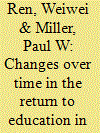

|
|
|
|
|
| Publication |
2012.
|
| Summary/Abstract |
Studies of the return to education in urban China have reported that this has increased over time, and that females typically have a higher return than males. In this paper we adopt a framework provided by the over education/required education/under education literature, and the decomposition developed by Chiswick and Miller (2008), to investigate the reasons for these findings. The finding by Chen and Hamori (2009), from analysis of data for 2004 and 2006, of the return to schooling for males exceeding that for females, is also examined using this decomposition.
|
|
|
|
|
|
|
|
|
|
|
|
|
|
|
|
| 4 |
ID:
089548
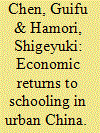

|
|
|
|
|
| Publication |
2009.
|
| Summary/Abstract |
This paper examines economic returns to schooling in urban China using ordinary least square (OLS) and instrumental variable (IV) methodologies. First, we find that OLS estimates of the returns to education are lower in China than in other transition economies, whereas IV estimates are higher in China. Second, we find that OLS, a method for estimating the returns to education without control for endogeneity bias, may underestimate the true rates of return for men. In addition, if we do not control for endogeneity bias and the sample selection bias, we may further underestimate the true rates of return for women. Finally, we find that OLS estimates of the returns to education for men are slightly higher than for women. The IV estimates for women are higher than those for men, and this difference increases after correcting for selectivity biases.
|
|
|
|
|
|
|
|
|
|
|
|
|
|
|
|
| 5 |
ID:
155720
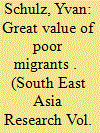

|
|
|
|
|
| Summary/Abstract |
Unskilled migrant workers and their families represent a crucial human resource in Sabah (Malaysia) as cheap labour, but also as religious believers. Christian organizations belonging to various denominations have started to cater to this community in recent years by providing educational services. Based on an ethnography of two schools led by charismatic South Korean missionaries and patronized by a Lutheran church with roots in Sabah, this article argues that ‘salvation’, as it is understood and practiced through education in these institutions, falls short of empowering migrants as a whole and rather contributes to reproducing their subordination as a community within Sabahan society.
|
|
|
|
|
|
|
|
|
|
|
|
|
|
|
|
| 6 |
ID:
079634
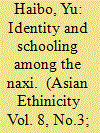

|
|
|
|
|
| Publication |
2007.
|
| Summary/Abstract |
This paper examines the role of schooling in constructing identity of Naxi secondary students in Lijiang, southwest China. The study shows that the school assigns an identity of the Chinese nation to Naxi students, while it also plays a role in forming their ethnic identity. The school curriculum, teachers' teaching, and interactions among students influence the identity construction of Naxi students. A qualitative method was designed to collect data for this study
|
|
|
|
|
|
|
|
|
|
|
|
|
|
|
|
| 7 |
ID:
149776
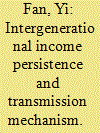

|
|
|
|
|
| Summary/Abstract |
In this paper I investigate the intergenerational income association and its transmission channels amid China's economic transition period using urban data from the Chinese Household Income Projects in 1995 and 2002. The estimated intergenerational income elasticity is 0.43 and 0.51 for cohorts educated prior to and after the market reform respectively, and reaches 0.71 among households with above average income in the post-reform era. Besides the conventional channel of education, this paper estimates the contribution from social capital and ownership of work unit across cohorts and income groups. There is weak evidence that prior to market reform, ownership of work unit contributes most to the intergenerational income persistence for households with below average income, while social capital leads the three contributors in households with above average income. However, in the post-reform era, parents with below average income invest statistically significantly in children's education which contributes most to the intergenerational income persistence. The leading contributor in families with above average income shifts to social capital. Possible explanations for such a shift lie in the ability and incentive of parents from different income categories to invest in their children. The results are tested through a series of robustness checks, and provide empirical support for promoting policies on the equality of opportunity.
|
|
|
|
|
|
|
|
|
|
|
|
|
|
|
|
| 8 |
ID:
098347
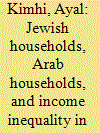

|
|
|
|
|
| Publication |
2010.
|
| Summary/Abstract |
This paper quantifies the roles of ethnicity, gender and location in rural income inequality in Israel. Between 10 and 16% of rural income inequality is explained by the Jewish-Arab divide. Schooling and household size, which are respectively much lower and higher among the rural Arab population, also explain significant fractions of income inequality. Location and gender of the household head explain much smaller fractions. Education-enhancing policies directed at the lower end of the schooling distribution, and at Arab municipalities in particular, are recommended to reduce per capita income inequality in rural Israel and narrow the Jewish-Arab gap. This could contribute to reducing the tension between the Jewish majority and the Arab minority in Israel, and to creating a better atmosphere for their neighborly coexistence.
|
|
|
|
|
|
|
|
|
|
|
|
|
|
|
|
| 9 |
ID:
137925
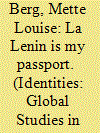

|
|
|
|
|
| Summary/Abstract |
Based on an ethnographic study of transnational networks of alumni of an academically selective boarding school in Havana, this article explores the nexus between mobility, schooling and belonging in the context of socialist Cuba and its diaspora. Drawing on Goffman’s work, I argue that the boarding school experience was transformative; it facilitated or consolidated social mobility for its pupils, which later, for many, led to geographic mobility in the form of study and work outside Cuba. After graduating, alumni continue to identify with the school and to reproduce their alumni identities. The affective webs of belonging forged through family links and friendships fostered at the school constitute emotionally sustaining networks that also provide material support after migrating. I propose that the school represents a site of identification for a globally dispersed non-national diaspora and argue that migration scholars need to embed international migration within people’s lives more broadly.
|
|
|
|
|
|
|
|
|
|
|
|
|
|
|
|
| 10 |
ID:
185972
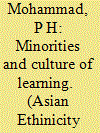

|
|
|
|
|
| Summary/Abstract |
What are the factors hindering educational development among Muslims in India in general and the newly born Telangana state in particular, is the key sociological question confronting the educationists and policymakers? The current paper based on empirical study provides an anthropological perspective to understand a number of socio-cultural factors responsible for lower retention and higher dropout rates among Muslims in public schools across the class and gender lines. It highlights that with positive state interventions, the enrolment and retention levels of Muslim working-class children have increased enormously besides a significant improvement in the same among Muslim girls also. Thus the paper argues that a relaxation in school protocols facilitates Muslim children integrating the academic demands and socio-cultural obligations they deem necessary while addressing culturally sensitive issues in curriculum and pedagogic practices foster attitudinal changes together which contribute immensely to the educational advancement among them.
|
|
|
|
|
|
|
|
|
|
|
|
|
|
|
|
| 11 |
ID:
078560


|
|
|
|
|
| Publication |
2007.
|
| Summary/Abstract |
equates nationalism with 'the organisation of human groups into large, centrally educated, culturally homogeneous units'. As the theorist of nationalism argues, and as recent and not so recent historical research shows, the modernisation of schooling is a defining moment in this process. The objective of this article is twofold: first, to show that during the Risorgimento schooling in Piedmont became nationalist; and second, to explain why that was the case. In doing so, it is argued that: (a) the modernisation of schooling reflected the rise of laissez faire liberalism, industrialisation and the enfranchisement of the middle class; and (b) the leadership of the Risorgimento revived pre-modern ethnic symbols of patriotism to legitimate inequality and state formation under conditions of individualism.
|
|
|
|
|
|
|
|
|
|
|
|
|
|
|
|
| 12 |
ID:
163468
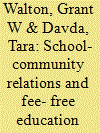

|
|
|
|
|
| Summary/Abstract |
While international and Pacific scholarship suggests that communities can play a significant role in improving access to schooling as well as school funding, infrastructure, and resources, there is little research on how school-community relations shape the implementation of fee-free education policies. This is particularly the case in the Pacific region. In Papua New Guinea, communities play a significant role in determining school funding, infrastructure, and access, but their role in implementing the country's fee-free education policy (introduced in 2012) is poorly understood. Drawing on data from two provinces with very different capacities for service delivery, this paper shows that school-community relations vary significantly, and are crucial for managing challenges associated with the country's tuition fee-free (TFF) policy, particularly in regards to access to schooling and improving school funding, infrastructure, and resources. While communities have helped advance the TFF policy's goals, conflict over land, the charging of fees, and the board of management (BOM)—a key local governance body—has, in some cases, undermined national efforts to increase enrollments and make up for the loss of school income from tuition fees. This paper argues that academics and policy makers need to pay greater attention to the sustainability of fee-free education policies, geographical variation, and the improvement of school-community relations. Doing so will require overcoming the tendency to focus on national-level indicators of success associated with fee-free education policies.
|
|
|
|
|
|
|
|
|
|
|
|
|
|
|
|
| 13 |
ID:
159479
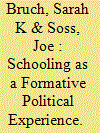

|
|
|
|
|
| Summary/Abstract |
How does formal education matter for inequalities of political behavior across the citizenry? Most answers to this question focus on the things that schools allocate, such as skills, knowledge, and resources. By contrast, we draw on policy feedback research to resuscitate a more “Deweyian” appreciation for schools as sites where citizens have their earliest formative experiences with public authority and learn what it means to participate in a rule-governed community. Using nationally representative panel data, we conduct an intersectional analysis of how race, class, and gender combine to shape student experiences with school authority relations, and estimate how these experiences are associated with later citizen dispositions in young adulthood. We find strong evidence that negative school authority experiences depress young adult political engagement and trust in government. American schools, we conclude, function as powerful sites of experiential learning that tighten the bond between social hierarchies and civic inequalities.
|
|
|
|
|
|
|
|
|
|
|
|
|
|
|
|
|
|
|
|
|